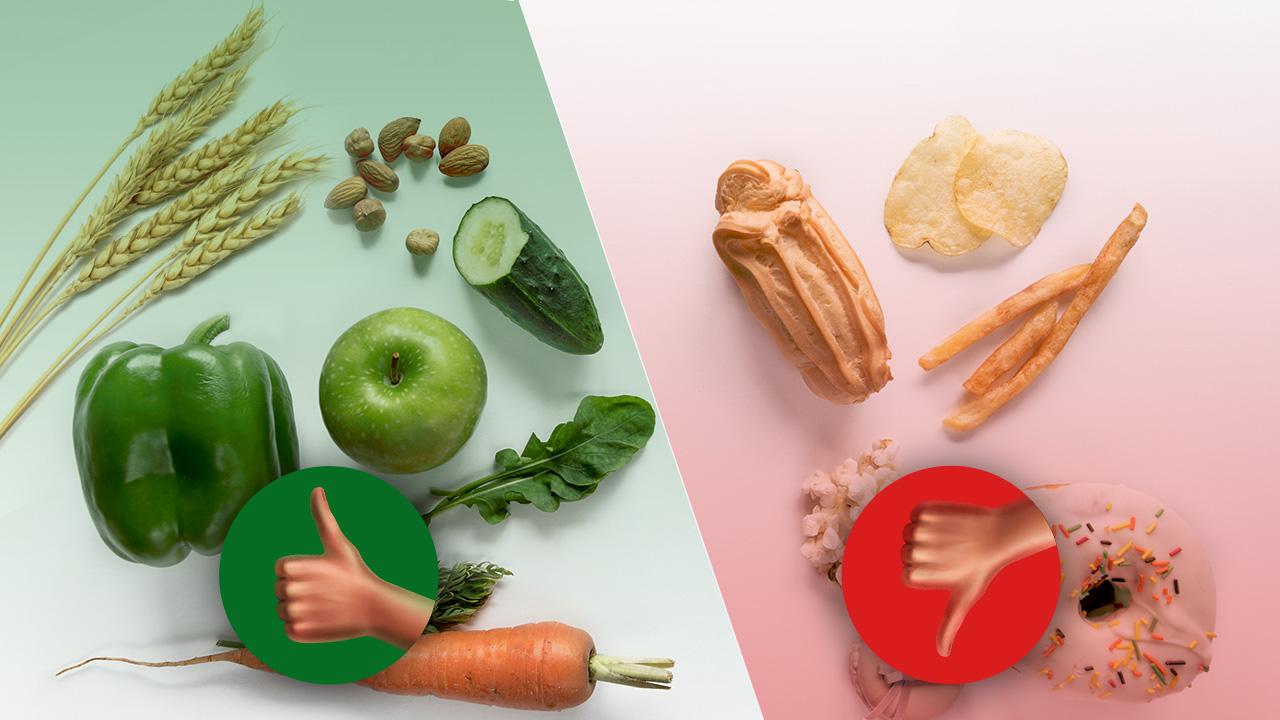
How do we adopt a healthy diet? As in the case with anything else in life, we shall keep it simple and start with the fundamentals. By following these simple rules, you will notice that a healthy diet is all about eating what is available around us in moderation and with awareness.
Do’s:
1.Have a thought out meal plan for every day of the week
This means we plan our meals and shop accordingly, with a list of what we need (and only what we need). It allows us to prepare a variety of meals over the week and saves us from the drab of eating the same kind of food day after day.
2.Include macro µ nutrients in a day’s meal plan
Macronutrients are Carbohydrates, Proteins and Fats. They provide the energy necessary for normal functioning of the body, preservation of its structure, and protection of vital organs.
Micronutrients consist of Vitamins (A, B1, B2, B6, B12, C, D, E & K) and Minerals like Iron, Calcium, Potassium, Sodium, Magnesium, Zinc and many others. These are essential for innumerable chemical/hormonal reactions in the body and are responsible for the smooth functioning of the nervous, digestive, circulatory systems and general body maintenance
3.Enrich your daily diet
Fill your diet plan with a combination of vegetables, fruits, grains, nuts, legumes and dairy. Taking from the previous point, the easiest way to include macro and micronutrients into the diet is by sticking to a simple formula in the daily menu.
- Carbohydrates – Rice/Wheat/Millets/Potatoes/Tapioca
- Proteins – Legumes (Dal)/Meat/Fish /Egg
- Fat – Seeds and Nuts, or oils made from them
- Vitamins & Minerals – Vegetables & Fruits
4. Drink 3 litres of water a day
Water helps regulate body temperature and protects tissues, bones and the brain. It helps in digestion and removes body waste, thus detoxing the body. Replace your beverages with water whenever possible. It not only controls sugar/calorie intake but also aids in better absorption of the nutrients.
5. Consume food rich in fibre
Fibre-rich food like whole-grain cereals, lentils, vegetables like carrot, pumpkin, broccoli, fruits like bananas, apples, etc provide bulk to the digestive tract and prevents rapid blood sugar absorption. This is helpful in the prevention of diabetes or cholesterol.
+1 Bonus: Control the intake of refined carbohydrates and sugar
Carbohydrates are processed in the form of sugar, and its variances in the bloodstream can lead to diabetes and a long list of related illnesses
Don’ts:
- Avoid any particular food group entirely – Like Carbohydrates or Fats
All food groups, especially macronutrients, are needed for the body in sufficient quantities for vital body functions. To skip one entirely could result in drastic consequences in the long term due to its deficiency.
2. Forbid treats. Take them in small quantities to prevent binge-eating
Recognise the soul-satisfying power of food. Food makes a person happy and content. It is a human tendency to want something denied with more vigour. Conscious eating is the key to balancing cravings and good health.
3. Fall for fad diets that promise quick results in a short time
Some diets promise weight loss through unreasonable food limitations that can have a massive boomerang effect over time. The human body is not meant for drastic changes in a short time.
4. Underestimate the power of food in healing
Fighting fatigue, increasing immunity, preventives against diseases – they all begin with food and dietary changes. India is a storehouse of wealth on the healing properties of food practised through Ayurveda and Food Science.
5. Depend only on the weighing scale
Losing weight is not the only goal: body measurements, how good you feel, stamina, better sleep, improved mobility, etc are also essential goals for good health.
And remember, it is essential to pair your healthy diet with daily exercise and a healthy lifestyle. Choose Elements Wellness Fit and Slim Therapy to aid you on your fitness journey!









